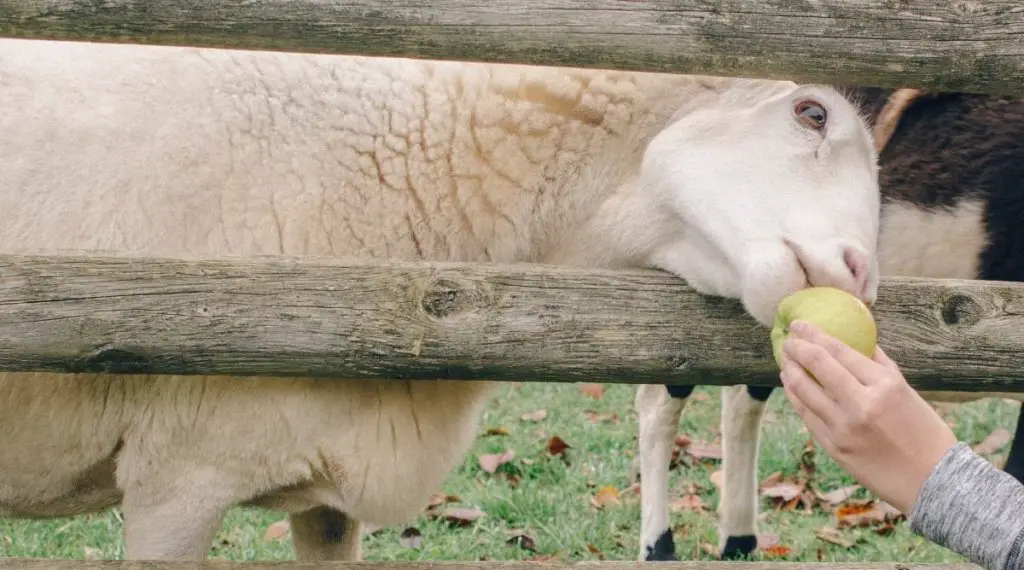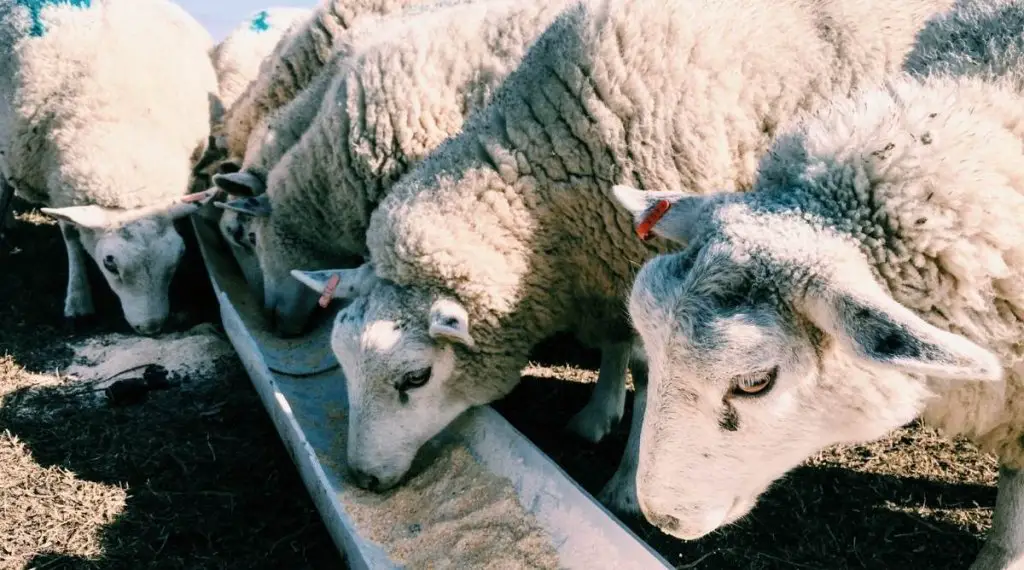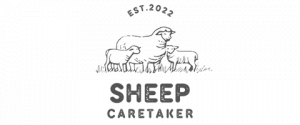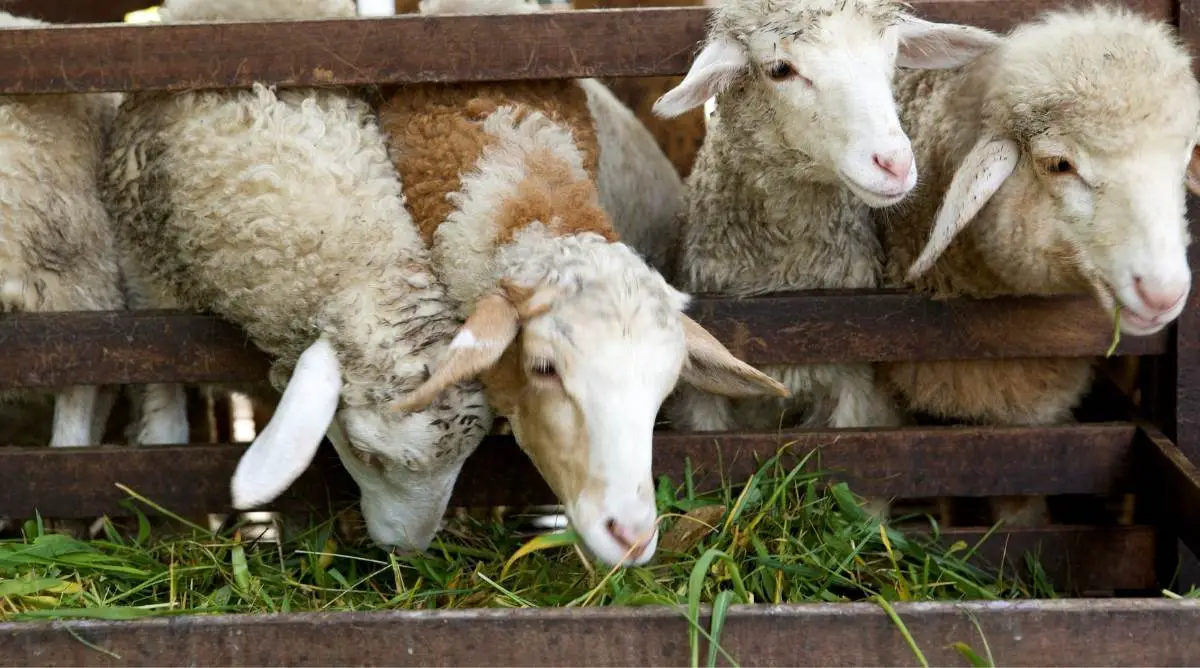Sheep eat various pasture plants, and they sometimes need vitamin or mineral supplementation to achieve a balanced diet. The majority of a sheep's diet consists of grass, hay, and other plants that they find while foraging. They can also have a small amount of treats like apples, carrots, and cucumbers. Read on to learn what they can and can't eat.
Table of Contents
What do sheep eat?
Sheep are herbivores and grazers, meaning they eat ground-based pasture plants.
An adult sheep’s diet consists of:
- Various types of grasses, like Italian ryegrass, perennial ryegrass, and orchardgrass
- Legumes, such as vetch and red clover
- Forbs (broad leaf plants)
- Hay
- Silage or haylage (green forage stored in silos)
- Baleage
- Crop byproducts
- Supplements (as needed)
Sheep need carbohydrates, proteins, fats, vitamins, minerals, and constant access to fresh, clean water. Sheep graze for up to seven hours per day.
Some plants they eat have more nutritional value than others, so you may need to give them supplements.
You can feed sheep grains for extra energy. This is usually done in underweight or sick sheep, as well as pregnant ewes. Since sheep love the taste of grain and can eat too much too fast, you need to only give it to them in small amounts. Never overdo the grains, as they cause bloating, and can be dangerous for ruminants.
| Normal diet | Occasional Treat | Never Feed These to Sheep |
| Grasses | Apples | Potatoes |
| Legumes | Strawberries | Tomatoes |
| Broad leaf plants | Carrots | Celery |
| Hay | Pears | Avocados |
| Silage | Lettuce | Citruses |
| Baleage | Grapes | Cabbage |
| Crop Byproducts | Cucumbers | Broccoli |
| Supplements | Squash | Brussel sprouts |
| Pumpkins | Cauliflower | |
| Pumpkin seeds | Kale | |
| Oats | Cherries | |
| Bread (very little) | Turnips | |
| Rhododendrons | ||
| Chocolate | ||
| Blue-green algae |
What can sheep eat as a treat?

While the majority of a sheep’s diet consists of the basics, like grass, and hay, small amounts of treats are permissible.
Always keep an eye out for bloating after giving them those treats, even though fruits and vegetables have nutritional benefits for sheep.
Treats that are acceptable for sheep in small quantities include:
- Apples
- Strawberries
- Carrots
- Pears
- Lettuce
- Grapes
- Cucumbers
- Squash
- Pumpkins
- Pumpkin seeds
- Oats
- Bread (small amounts)
If you feed your sheep bread, make sure it’s just an occasional treat in small amounts, as its high grain content can be harmful to them.
What do lambs eat?
A lamb is a young sheep aged a year or less. Lambs don’t have permanent teeth until they reach a year of age.
When they are born, it’s crucial for lambs to consume colostrum from the mother’s milk. Colostrum milk contains bioactives and antibodies that help activate a lamb’s digestive system microorganisms.
After the first feed, lambs mostly nurse, gradually grazing more and more on solid food. After about a month, a lamb’s diet usually becomes more than 50% solid food.
Lambs are normally fully weaned from 90 to 120 days of age. At first, they eat tender grass and finely ground forage. Keep in mind they need protein in their diet for their growing muscles.
Here’s a list of what lambs eat:
- Grass
- Alfalfa
- Legumes
- Grains
- Hay
- Forbs
- Cottonseed meal
- Cornmeal
- Peanut meal
- Soybean meal
- Barley
Which vitamins and minerals do sheep need?
Sheep need the following minerals and vitamins to stay healthy:
- Calcium, for strong, healthy teeth and bones
- Phosphorus
- Sulfur
- Vitamin A, for teeth, bones, skin, soft tissue, and vision
- Vitamin C, necessary for normal growth, development, and bone reparation
- Vitamin B
- Vitamin D
- Vitamin E
Most basic nutrients can be found in forage. For example, green forages contain vitamins A and E. Black oil sunflower seeds contain vitamin E as well. Calcium is naturally found in various foods, such as green leafy vegetables, dairy products, almonds, dried beans, and some seafood.
If you need supplementation for your flock’s diet, mineral blocks and salt licks are excellent sources of additional nutrients.
What do pregnant and nursing ewes need?
Late-gestation and lactating ewes have special nutritional requirements.
In the last four to six weeks of pregnancy and six to eight weeks after lambing (during lactation), they need more nutrients (protein and energy) than usual. This is important, as poor diet in pregnant ewes may cause numerous issues, such as:
- Pregnancy toxemia
- Early embryonic loss
- Low lamb survival rate
- Reduced milk production
Supplements include:
- Grain
- Vitamin E
- Calcium
- Selenium
- Iodine
- Copper
- Cobalt
Bloating from grain overload can even be life-threatening if severe. Make sure to moderate grain consumption in ewes. Introduce any dietary changes only if needed, and do it slowly to avoid upsetting the digestive tract of the animal.
Grass quality significantly drops during the winter, so you’ll need to pay special attention to feeding lambing ewes in your flock.
Sheep feeding logistics

Sheep get most basic nutrients through grazing. However, you’ll also need three feeders and a waterer to ensure their continuous access to food and water. A hay feeder, a grain feeder, and a feeder for minerals plus an automatic or thermostatic waterer are sufficient for your sheep farm.
In general, adult sheep need about 0.03 pounds of food per pound of body weight. Depending on the sheep breed, one sheep may average from 100 pounds to 350 pounds.
The amount of land you’ll need to feed your flock of sheep depends on the soil quality, precipitation level, and pasture management. You’re likely to need more land for feeding during the dry season (in the summer) due to the lack of rain.
Some farmers own multiple fields and practice livestock rotation to prevent sheep from spending food resources from one pasture.
What do sheep eat during winter?
An average 4.5 pound sheep consumes five small bales of hay during the winter season. Sheep can also be fed haylage and silage. Keep in mind that lambs need high-quality fodder during winter to support their growth.
Can sheep eat apples?
Sheep can eat apple slices in small quantities . While apples are rich in vitamins C and A and apple skin contains fiber and potassium, apple seeds are toxic for sheep. Therefore, cut the apples into pieces and toss the seeds before giving them to your flock.
What can sheep not eat?
Some plants and other foods are poisonous to sheep. You should never give them these foods:
- Potatoes
- Tomatoes
- Celery
- Avocados
- Citruses
- Brassicas (cabbage, broccoli, Brussel sprouts, and cauliflowers)
- Kale
- Cherries
- Turnips
- Rhododendrons
- Chocolate
- Blue-green algae (can form on water supplies and is highly poisonous)

